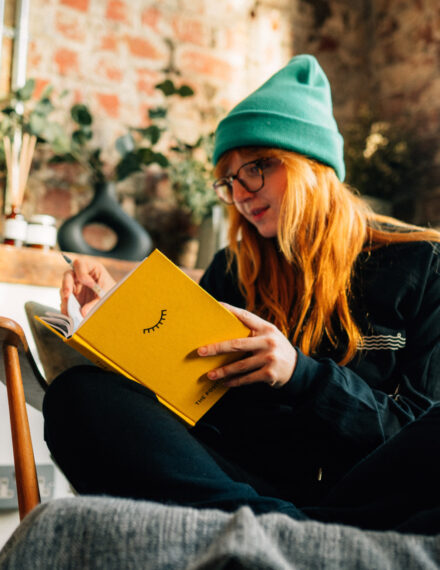4 Things my Autism Diagnosis Taught Me (and 1 thing it didn’t)
post by Guest Contributor
Heather shares her experience of her Autism diagnosis, and a few lessons that she learned along the way.
There’s a lot of relief to be found in realising you aren’t alone. This was especially the case when I realised I was Autistic, and then diagnosed with it four years later. When I understood why I was like this, I also began to understand some lessons in self-compassion that became crucial to keeping my head above the waves. Let’s dive in!
1. When something helps, embrace it. Accommodate your needs.
Autism affects every aspect of your life.
Before I knew I was Autistic, I knew I was Something. I hated 90% of foods. I couldn’t hang with my friends without knowing the exact details of who was going, where it was, and what we were going to do in precise detail and chronology. Things like noise or mess would make me so upset I’d have a panic attack (or a meltdown, though I didn’t know that at the time). But I found it hard enough to tell people about things I found difficult, let alone ask that we work around my issues. What was the point? Surely these were just quirks I’d have to get over? I was just being silly, neurotic, over-sensitive. I didn’t understand WHY it hurt me, it just did. And I thought it was on me for not being able to cope. I thought I had to just get a grip. But this kind of negative self-talk only made my struggles harder.
Realising I was Autistic allowed me to be kinder to myself.
My Autism diagnosis, like for so many people, was a total lightbulb moment. It explained everything — but it also meant it wasn’t my fault. I wasn’t being difficult; I wasn’t being irrational; and most importantly, the things that upset me weren’t things I could get over. I couldn’t just “get used to it”. It was my Autism, and it was necessary to work around it if I were to survive. Every struggle I had was suddenly validated. And so, rather than forcing myself into situations that hurt me, I finally began figuring out how to make it easier for myself. I gave my friends a list of restaurants I can eat at. I asked for as clear communication as possible when making plans. I bought myself some Flare earplugs to wear in class. Not only did my “panic attacks” vanish, but I became so comfortable in my own skin that I could make spontaneous plans, try new foods, and other things that I thought I’d never be able to do without hurting. It allowed me to leave my comfort zone safely, and it allowed me to be kinder to myself when challenges persisted.
Accommodating my Autism has allowed me to thrive.
This has only become more true as time has gone on. Without a doubt, if I had not fought to be placed in a studio flat in uni halls, I would have dropped out before freshers’ week was over. I’m able to live in a city I love because I accommodate my sensory issues with noise cancelling headphones, earplugs, and a playlist full of heavy tunes. Even when someone’s Autism is known, accommodations can be dismissed as preferences and personal hang-ups. But I’m not being picky: accommodations allow me to survive. Understanding that I am Disabled, and that these changes make the world accessible to me, was revolutionary. There is no shame in taking small, however unusual, steps to make your day-to-day life a little easier.
2. Treat the things you love like they are vital for your survival. Because they are.
Autistic people often have special interests.
When I say I can’t imagine what it would be like to live a life without Autism, one of the main reasons I say that is because of this: Autistic people often have very intense passions for specific subjects. The stereotype of an autistic seven-year-old boy who loves trains, albeit harmful, is a stereotype for a reason, right? When I found out I was Autistic, I took my passion for writing, music, and David Attenborough documentaries, and realised these were all my special interests. This wasn’t hugely surprising — if you get me talking about my novels, good luck in getting me to shut up about them — but, knowing it was because of my Autism was a blessing. It was the first time I was grateful to be Autistic. It’s a myth that Autism is a superpower: my life is absolutely made harder because of it. But, knowing Autism has also made me creative, hard-working, and curious was much more affirming early on in my journey.

Embracing my passions helped me survive.
Along with this, understanding my special interests for what they were also unlocked some mysteries around my other mental struggles. For me, depressive episodes are born from a lack of routine and an absence of special interests — essentially, from neglecting my Autism. Therefore, understanding special interests as mandatory for my wellbeing was revolutionary. They became a priority. When I was a teenager, I would wake up two hours before I had to leave the house, so I had time to write and engage in my special interest first thing in the morning. This incidentally then gave me enough willpower to push through sitting in sensory hell (AKA: high school) for the next six hours. I’m not saying you have to go quite as all out as that (heck, I don’t even do that anymore). But, once you make joy a priority, self-care a non-negotiable, and actively invest in what makes you happy, the difference is immeasurable. Autism taught me that passions are vital to getting through the days. There are no other options.
3. Being true to yourself is what allows you to carry on.
Autistic people often hide their symptoms.
Autism, among other things, is a social disability. An aspect of Autism effectively means you can’t filter sensory information, so things like social cues and norms go straight over our heads because we’re too busy taking in EVERY SINGLE THING in a given environment to even begin to infer that sort of rubbish. (This is a slight oversimplification, but you get my point). But, this often isn’t received well by a neurotypical world that doesn’t understand us. To cope, a lot of Autistic people will pretend not to be Autistic to get by a little easier — this is called ‘masking’. It has its benefits — you might not be bullied as much, for example — but it also has its costs. Before I knew I was autistic, I would leave every social interaction, from saying hello to a cashier to a night out with my friends, feeling hollow and performative. I knew I hadn’t been myself, but I didn’t know why, or what I could do about it. Realising I was Autistic put name to face. But the big lesson took a little longer to learn.
Masking is a coping mechanism, but it isn’t healthy.
Masking is a raw deal. It’s super draining to pretend to be someone else 24/7, especially when you’re already dealing with sensory hell. It also isn’t convincing. Studies have shown that neurotypical people can tell when an Autistic person is masking almost immediately when meeting them. They might not necessarily be able to identify that the person is Autistic, specifically, but they’ll know something is up, and that, again, is usually not received well. In other words, masking was like a exam that I failed every time, no matter how hard I studied and no matter how hard I tried. Realising I was masking, and not just a hollow shell of a human being, meant it was so much easier for me to unmask and figure out who the heck I really was. I tore up the exam paper. Once I unmasked, everything became so much easier. My social anxiety faded away because I was no longer so desperately micromanaging how I was perceived. My confidence skyrocketed because I was able to recognise myself for the competent, passionate person I am. Being true to yourself, whatever that looks like, can completely transform things for the better.
4. I’m strong as HELL.
Did you know, if you give Autistic people brain scans, pain receptors flash up when they experience sensory discomfort? In other words, when I’m near a Bad scent, around lots of Bad sounds, or eat a Bad food, I’m actually physically suffering. Learning this was quite vindicating to tell people who undermined my sensory issues, I’m not gonna lie, but it also serves as a testament to my resilience. Though learning I was Autistic explained a lot of issues I faced, it also highlighted areas of my life which I didn’t realise were affected by Autism. I assumed everyone just felt like they were having an aneurysm when standing under certain lightbulbs. Incidentally, ‘mind blindness’, or assuming everyone’s inner world functions the same of yours, is a common occurrence among Autism people. It literally affects everything! When I learned that not everyone struggled with these things, I realised how much more I had on my plate than other people. Not only did it make a lot more sense why I found things a lot more draining than my mates, but it also showed how strong I was. If I can rock up to work and get a good job done while ALSO fighting off sensory discomfort, then I can get through anything. Sensory issues are unavoidable, but the fact that I am able to withstand them despite it all is cold hard proof that I’m tough as nails. And I’m only getting stronger with each day.
And the one thing my Autism Diagnosis didn’t teach me…
Understanding my Autism has been invaluable. It’s taught me so much.
But it didn’t teach me that things get easier.
There is a bell curve to the Autism Epiphany. Because I knew I was Autistic, things I had gotten used to squashing down or ignoring (as best I could) now had a bit AUTISM flag attached to it. While the diagnosis explained the issue, it beat down any coping mechanisms I had managed to establish. Suddenly, it felt futile. If the problem is my Autism, then it’s in my BRAIN, and I can’t change my brain chemistry. I especially felt this in a social context, before I learned to unmask. I thought I’d never be able to get a retail job, let alone do one voluntarily, because I Couldn’t handle people. I Couldn’t grow past it. Funnily enough, the Autistic trait of rigid thinking extended to my understanding of my own Autism. In this sense, my diagnosis did feel a little like the death of certain futures.
But, this totally was untrue. Between accommodating my needs, investing in my special interests, and learning to love the creative, sensitive badass who I am unmasked, I was able to grow past milestones I couldn’t even imagine. Every Autistic person is affected by their Autism differently; for some people, working itself is off the table, and some Autistic people are far more extroverted than I am. It’s all valid. There are also some things I will never be able to handle. I’m looking at you, Primark. But embracing my Autism, and who I am as an Autistic person, has only improved things for the better. Even when things get tough, I’m better equipped than ever to get myself through them. It’s only up from here.
If you found this useful..
Please consider checking out our merch with a message! It helps support our work, and means you get some sweet new threads too, everybody wins really..! Here’s Heather’s top picks, but you can view the whole collection by hitting the button below!
-
 “I’m Glad You Exist” Long Sleeve£30.00
“I’m Glad You Exist” Long Sleeve£30.00 -
 ‘Daw Eto…’ Crewneck – Eucalyptus£50.00
‘Daw Eto…’ Crewneck – Eucalyptus£50.00 -
 The Positive Planner£24.00
The Positive Planner£24.00
Enjoy this post? Feel free to share
More posi-content
Have you found a creative way of overcoming self-harm and keeping your head above the waves? Share your experiences to inspire others!
find out more
0 comment/s